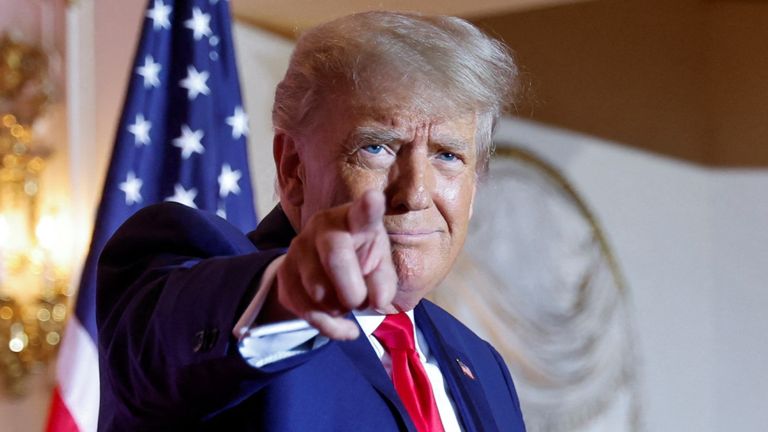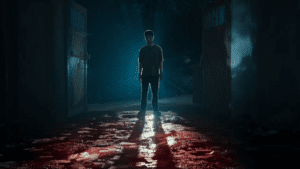How has Donald Trump Inspired Andor? Star Wars Andor season 1 has wrapped on Disney+, and with it shows the start of Cassian Andor’s journey of rebellion. But the series has had immense political and social commentary, some of it historical and other bits more contemporary. Spoilers for the Andor season 1.
Andor season 1 has just finished, and it’s been phenomenal. Right from the start, the series has been an engaging exploration of a galaxy that is now under the thumb of oppression, with clever writing and direction. Showrunner Tony Gilroy has proved once again that he understands what is needed to make good Star Wars, but this isn’t to forget the brilliant performances, masterful direction, beautiful cinematography and great score.
One of the ways that the season differs from most of the projects that Disney has so far released is its intense political focus. From lofty buildings on Coruscant to the cold caves where revolutionaries plot, there is no shying away from the machinations that are rarely shown. But that’s not the only politics the show has to offer. Throughout the series, there is a social commentary on our society and history, holding up a damning mirror. Gilroy mentioned this in an interview for Variety. Modern politics is less of a concern for him, but if it does land, then “it’s just like the mirror.”
How has Donald Trump inspired Andor?
In an interview with Empire Magazine, Maarva actress Fiona Shaw explains that Andor is a “scurrilous take on the Trumpian world” with “people’s rights disappearing.” This is a highly polarising viewpoint, but it’s clear where she got the idea from.
In the final episode of Andor, Maarva gives an inspiring speech about the need to rebel, telling the citizens of Ferrix that they’ve been asleep and that they need to wake up and fight the Empire. This causes the citizens to protest, throwing themselves at the Imperial line, trying to get to the Imperial hotel. Wilmon Paak, having seen his father unjustly killed by the Empire, builds and launches a bomb into the Imperial line, prompting them to relentlessly open fire on the other rioters, rioters who don’t have the means of deadly force like the Empire.
The riots on Ferrix seem to bear a hallmark of those that happened in Portland, 2020. The city of Oregon experienced intense unrest in the wake of George Floyd’s death, with some turning riotous and violent. Donald Trump, always a huge proponent of police power and heavy action, decided to send in federal law enforcement, with disastrous effects. Many agents wore camouflage uniforms, operated without identification, and unloaded tear gas onto protestors. Agents even used unmarked vehicles to detain people in the night.
This response was criticised as “performative authoritarianism,” and “made for TV fascism.” The American Civil Liberties Union put out a statement criticising the militarized federal officers. What happened in Portland is likely what Fiona Shaw is referring to here, with the people of Portland losing their rights to freedom of speech to the evil of Donald Trump. This behaviour from Trump is certainly one the Empire indulges in on Ferrix. Both abuse their power at the expense of others.
But Andor also takes inspiration from other politicians. Talking to USA Today, Mon Mothma actress Genevieve O’Reilly explains that she was inspired by watching speeches by US House Representative Alexandria Ocasio-Cortez (AOC), former German Chancellor Angela Merkel and New Zealand’s Prime Minister Jacinda Ardern.
These people are “voices against the status quo, women who are willing to risk their voice in popular culture to stand up for what they believe in,” O’Reilly says. “And I think we see Mon do that in Andor.”
Watching the show, this inspiration is evident. Throughout the show, Mon Mothma is a constant champion for minority rights, such as the Ghormans (who have had their access to food cut off), and the Separatists, both targets of Imperial oppression. She’s committed to fighting Imperial oppression and executive overreach, despite the fear and intimidation from the Empire. AOC is committed to defending minorities, a role that only intensified under Donald Trump’s presidency.
AOC has also hit back at Trump’s overreach, saying that she would fight the “fake emergency” Trump created to take funds for his Mexican border wall, after Congress refused to grant them. She’s also been the target of Trump’s vicious tirades, where in one incident, Trump told her and 3 other politicians to “go back” to where they came from, despite being American citizens.
How has colonialism inspired Andor?
Andor doesn’t just comment on modern politics. It also shines a light on the historical injustice of colonialism, with Tony Gilroy explaining to Vanity Fair back in June that we will see the Empire take a planet apart “in a colonial kind of way.”
This comment is clearly referring to the Empire’s actions on Aldhani, the focus of episodes 4 to 6. Here, the Empire has taken over the planet and forced the rightful residents away from their lands. Vel tells Andor in episode 4 that the Aldhanis have been relocated to Imperial housing and forced to work in Imperial factories, building equipment for the Empire. The Empire is stealing Aldhani’s wealth from the planet, unfortunately, similar to how European Empires would exploit their colonies for wealth to enrich themselves.
A dam is built on their sacred ground, blocking a holy river and destroying a local temple. While in Andor the Imperials allow for the Aldhanis’ pilgrimage, they want to build an airbase on this ground, stopping this in the future. The Imperials lease the land from the Aldhanis’ for three years, but it’s clear that the treaty intends to come to an end, and the Empire will simply take over the land.
Now, there have been many colonial fights across history, mostly perpetrated by the West. Gilroy hasn’t specifically said which fight he was referring to, but to look in the modern mirror, he could be drawing off the experiences of the Native Americans, who in recent times are fighting an oil pipeline that goes through their historic lands. They accuse the project of being “cultural genocide“, as spillages will pollute the lands that the tribe use. The Aldhanis will lose their land, live in a polluted zone, and face more pollution from the airbase. They won’t be able to participate in their sacred rituals.
The US dishonours treaties it has with the native population, stealing land, such Mount Rushmore. In The 1800s, the US signed treaties with the Great Sioux Nation, establishing a permanent home for them in the Black Hills, a land they consider sacred. But this treaty wouldn’t last, with gold prospectors being allowed to mine the lands, forcing the Sioux to flee. In Mount Rushmore, the heads of four US presidents were chiselled into the mountain, which the Sioux consider holy. The Supreme Court in the 1900s ordered the US to pay $2 million in compensation, but the Sioux refused, saying the land wasn’t for sale.
The US still hasn’t given back the land today.
How has ideology inspired Andor?
Andor shows the Rebellion as audiences have rarely seen it before, scattered, afraid, and often at odds with one another. In this way, Tony Gilroy presents them as an insurgency, performing covert hit-and-run actions on key targets. The group is split up into cells, so if one goes down — like Anton Kreegyr’s cell — it doesn’t affect the Rebellion as a whole.
The Aldhani heist shows this well, with Andor using a fake name, not talking about Luthen and only learning bits of information as needed. At any sign of Imperial activity, Vel and the others hide their guns. While the Empire are always a superior force to the Rebel Alliance, they’re able to operate openly. In Andor, they’re not strong enough to do that.
Some insurgencies are more brutal. Saw fits this well, refusing the help of anyone, with actor Forest Whitaker giving him an unhinged and paranoid demeanour. He believes he is the only one with “clarity of purpose”, showing a messiah complex like many terrorists. Luthen’s methods are surprising, shocking both the Imperial spy Lonni and Saw when he is willing to let Kreegyr and around 30 other men die. He wants people to suffer, believing they will rise up when everyone feels the Imperial boot. “Oppression breeds rebellion.”
Marxism is an ideology that comes up frequently in the show. Marxism originated in the late 1800s with Karl Marx saying that the ruling class oppress the working class, and the working class needed to revolt. This can be seen in the collectivist revolt on Ferrix (a strongly working-class community) and the fight against the Imperial elite. “They’re so proud of themselves. So fat and satisfied,” Cassian explains. The Imperials gorge themselves fat on authority and power and suppress attempts of others trying to escape their abuse.
Nemik is a firm believer in this revolutionary ideology, and in episode 5, he explains the trick of the Imperial thought machine. He points to the over-reliance on Imperial technology, arguing it’s made its citizens forget their freedom. This sounds very much like the Marxist idea of the ideological state apparatus, where the ruling class expands their control through persuasive means, such as indoctrination. These methods are much more subtle than police and armies, something that Andor draws attention to.
It’s also something that is apparent in our world. We are reliant on our phones, such much so that we’ve forgotten what it’s like without them. Companies know this, and exploit us through them, harvesting our data and attention for money and control.
How has the US prison system inspired Andor?
Episodes 8 to 10 of Andor show a bleak Imperial prison facility on Narkina 5. Inmates are expected to do labour throughout their time, but this is only the start.
Andor takes aim at US private prisons, which need a steady stream of prisoners to remain profitable. To do this, they lobby for stricter laws, including the war on drugs to keep a flow. This has led to mass incarceration still present today, with America having the highest prison population in the world, at around 2 million. US prison workers produce nearly $11 billion of goods per year, for poor pay.
The Empire practices this same mass incarceration policy, with the PORD vastly expanding crimes and sentences. While prisons in Andor are run by the state, the Empire takes part in the private prison model. The Empire needs infinite labour to run its war machine, so they need an infinite amount of prisoners. But there are so many people in the galaxy. To keep a healthy churn, the Empire adopts more and more restrictive legislation to arrest more people, all whilst saying only criminals need to be worried, an argument seen in episode 8.
The Empire has taken this infinite prisoner problem to its logical conclusion. Instead of releasing people, they’re kept indefinitely. To prevent rebellion, they’ve created the illusion of a game. This game keeps prisoners against each other and hands out scraps for rewards. To keep the pretence that prisoners are released, each prisoner has a sentence countdown. But prisoners aren’t released, they’re just reassigned, allowing the Empire to expand its workforce and provide a guise of security to the outside world.
This rigged game is similar to capitalism. It promises the reward of riches if people just work that bit harder, and it pays to step on people to improve yourself. But in reality, this promise of riches is mostly false and is held to keep people from banding together and revolting.
How do you think Donald Trump has inspired Andor? And what other political inspirations do you think the series feeds off? Comment below.



